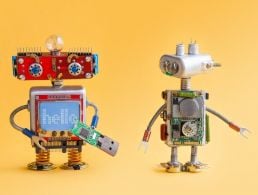Nicola Mortimer, head of business products, marketing and operations at Three Ireland, on how machine learning can drive efficiency rather than drive people out of their jobs.
2017 will be a year of dramatic acceleration in the pace of development of artificial intelligence (AI) and the internet of things (IoT). Machine learning is predicted to be an integral part of more than 300m new smartphones sold this year. So, should we be excited or fearful for our jobs?
It has been predicted that machine learning capabilities will be present in more than 20pc of smartphones sold globally in 2017. With few devices more ubiquitous in the developed world than the smartphone, machines that learn will now be at the fingertips of a large percentage of the population.
What will the increasing development of machine learning, AI, machine-to-machine (M2M) communication and IoT mean for business and industry, and the people who work within them?
One of the important things to realise about the way machines learn, and therefore develop intelligence, is that it is not a mysterious, science-fiction process. Machine learning produces, in effect, nothing more than glorified data crunchers.
Machines that learn can learn only from the data they receive and analyse. What makes them such quick learners and so apparently intelligent is that – unlike humans – they can receive, absorb and analyse all the relevant data in the world at incredibly high speed, and then use it to inform the decisions they make.
Importantly, for the development of true AI, these machines are now also beginning to learn from the data and adapt their behaviour accordingly. For example, at the simplest level, Google Translate now adapts as it learns, to make its translations more accurate.
At the other extreme, data gathered from the journeys of Tesla test vehicles is uploaded to the cloud and made available to all Tesla driverless cars. This means if a test vehicle has driven a stretch of road, when another Tesla vehicle travels it for the first time, it will know how to brake for a specific corner, which lane to take for a turn, even what driving line to take to avoid a large pothole.
Those examples pose a threat to the chauffeurs, taxi drivers and language interpreters of the world, but should the rest of us be concerned that ‘the machines will take over’ in other areas of employment? Is it long before intelligent machines make huge swathes of the workforce redundant?
No. The truth is, jobs will be made easier and workers will be made more effective by the growing presence and influence of this technology.
Rather than replacing doctors, for example, AI can supplement their role by analysing data from patient sensors, which are monitoring blood pressure, blood oxygen levels, respiration, heart rate and so on. It can then compare that data against all the relevant data available and, based on aggregated figures, make a diagnosis of the patient’s condition and even suggest possible treatment. The doctor will still be the ultimate arbiter, but can make a quicker and more effective decision knowing that all relevant inputs and similar case histories have been assessed.
Machine learning can drive efficiency without necessarily driving people out of their jobs. Before this can happen however, there are many elements which need to be in place. Reliable communications networks need to be available. Appropriate sensors need to designed and installed. Databases need to be created and populated. Applications need to be developed.
As the ecosystem of IoT develops, and more and more machines begin to communicate with and learn from each other, businesses from apps developers to mobile communications providers will need to be working together to put all the links in the chain in place.
Whether that will enhance the capability and efficiency of the workforce, or threaten its very existence, is something no one can know for certain until it happens. The most likely scenario is that it will simply help us to work more efficiently and effectively, and to ensure the future is more evenly distributed for the benefit of all.
Nicola Mortimer is the head of business products, marketing and operations at Three Ireland. With extensive experience working in the telecoms industry, Mortimer has held leadership roles at Verizon, BT and O2 Ireland.




